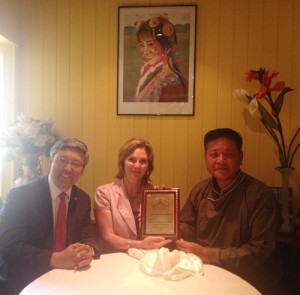
Ms Maya Graf, Speaker of the Swiss Parliament, (centre) Mr Penpa Tsering, Speaker of the Tibetan Parliament in Exile (right) and Mr Tseten Samdup Chhoekyapa, HH the Dalai Lama’s representative in Geneva (left)
Photo: tibet.net
As the toll of self-immolations reaches 120, the Tibetan Parliament-in-Exile has reiterated its appeal to the United Nations and governments to send fact-finding missions to Tibetan areas, and has called on the 47 member states of the UN Human Rights Council to hold an urgent meeting on the crisis in Tibet.
UN High Commissioner for Human Rights, Ms Navi Pillay, has recently said: “I have issued public statements, asking China…to look into the root causes of the suffering of the Tibetans and why they are…driven to such extreme measures of protests”.
In an editorial “Fighting Fear”, the Indian Telegraph has said that China can ensure peace and stability in Tibet only through resumption of the stalled talks with the Tibetan leadership, and acceptance of the Dalai Lama’s moral presence among the Tibetans, adding “Beijing’s policy on Tibet relies so heavily on State violence because it is driven by fear.”
In Zurich, the Speaker of the Swiss Parliament, Ms Maya Graf, met Mr Penpa Tsering, the Speaker of the Tibetan Parliament-in-Exile who briefed her on the present situation inside Tibet. Mr Tsering also spoke about the Middle Way Approach and the support for this policy from both the international community and Chinese people. He attended an international conference on Tibet in Turin, Italy, and in Rome he met with long-time Tibet supporters and members of the Italian Parliament. The Italian parliamentarians agreed to set up a Tibet Group within the parliament.
Australian Foreign Minister Bob Carr has voiced hope for an easing of tensions in Tibetan regions. Addressing the Australian Chamber of Commerce in Hong Kong, Carr told reporters that negotiations on autonomy between Beijing and the Tibetan community are key to resolving the tensions and ending the spate of self-immolations by Tibetan protesters. “We believe there’s an opportunity for pursuing autonomy”, Carr said, adding that “China said things that encourage us to think that the talks could be given a new lease of life.”
The United States said that it raised the issue of human rights in Tibet during talks with China during the two-day US-China Strategic and Economic Dialogue held in Washington. “We…expressed our ongoing concerns about human rights in China, particularly recent instability in Tibetan and Uighur areas of China” Deputy Secretary of State William Burns said, adding “We firmly believe that respect for universal rights and fundamental freedoms will make China more peaceful, more prosperous, and ultimately more secure”.
The US annual human rights dialogue with China is scheduled for July 30-31. “The two sides will discuss rule of law, freedom of religion, freedom of expression, labor rights and rights of ethnic minorities, and other human rights issues over the course of the dialogue,” said US state department spokesperson Jen Psaki.




 Print
Print Email
Email